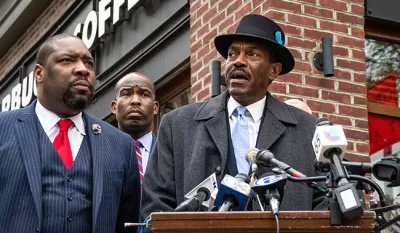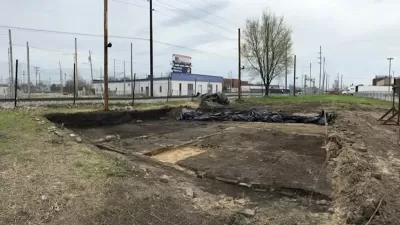Elijah Anderson writes that a spate of highly publicized recent incidents has highlighted the frequent racial targeting that blacks face as they live, work, study and otherwise navigate “white spaces.”

A spate of highly publicized recent incidents has highlighted the frequent racial targeting that blacks face as they live, work, study and otherwise navigate “white spaces.” In recent weeks, through the lens of various video cameras, we have seen: the police arrest two black men for sitting in a Starbucks in Philadelphia, a white student call the police on a black student for taking a nap in a common area at Yale, and three black filmmakers surrounded by police as they checked out of an Airbnb rental in a white neighborhood in California.
FULL STORY: Black in White Space

Planetizen Federal Action Tracker
A weekly monitor of how Trump’s orders and actions are impacting planners and planning in America.

Chicago’s Ghost Rails
Just beneath the surface of the modern city lie the remnants of its expansive early 20th-century streetcar system.

San Antonio and Austin are Fusing Into one Massive Megaregion
The region spanning the two central Texas cities is growing fast, posing challenges for local infrastructure and water supplies.

Since Zion's Shuttles Went Electric “The Smog is Gone”
Visitors to Zion National Park can enjoy the canyon via the nation’s first fully electric park shuttle system.

Trump Distributing DOT Safety Funds at 1/10 Rate of Biden
Funds for Safe Streets and other transportation safety and equity programs are being held up by administrative reviews and conflicts with the Trump administration’s priorities.

German Cities Subsidize Taxis for Women Amid Wave of Violence
Free or low-cost taxi rides can help women navigate cities more safely, but critics say the programs don't address the root causes of violence against women.
Urban Design for Planners 1: Software Tools
This six-course series explores essential urban design concepts using open source software and equips planners with the tools they need to participate fully in the urban design process.
Planning for Universal Design
Learn the tools for implementing Universal Design in planning regulations.
planning NEXT
Appalachian Highlands Housing Partners
Mpact (founded as Rail~Volution)
City of Camden Redevelopment Agency
City of Astoria
City of Portland
City of Laramie





























